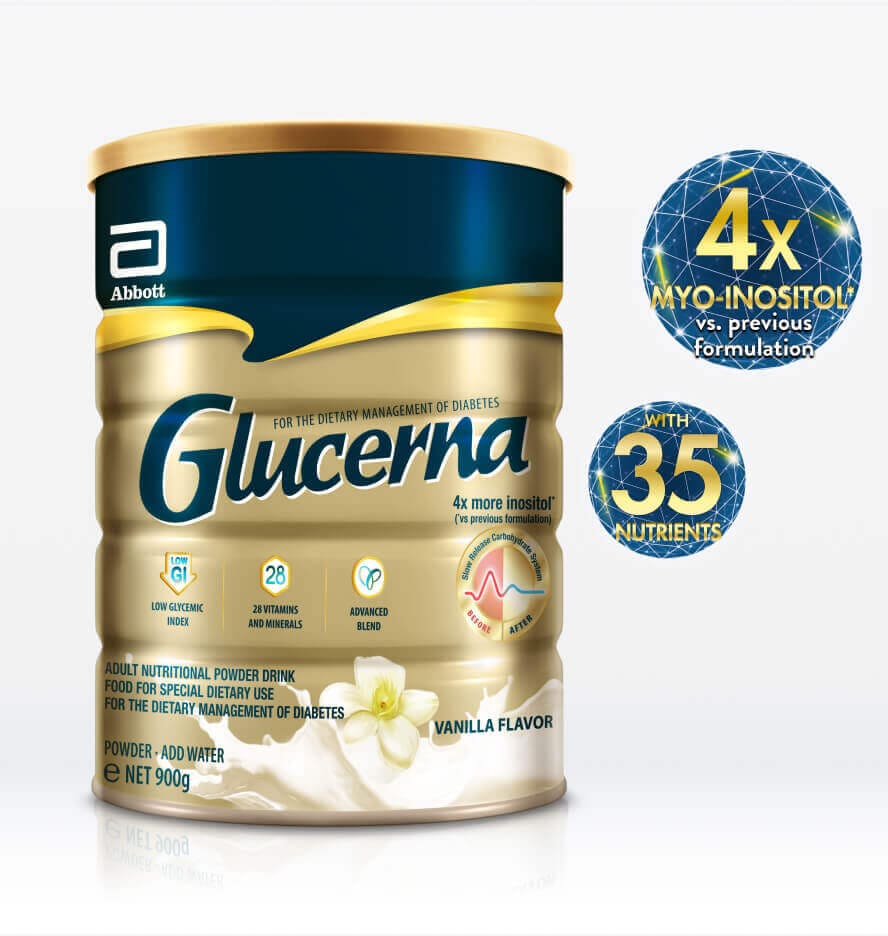Glucerna Vanilla Flavor
- Title
- Glucerna® Vanilla Flavor
- Detail Page Path
A healthy diet is one of the best tools for managing diabetes. Some patients may be encouraged to lose weight to help keep their diabetic condition in check; always seek your doctor’s advice to find out if weight loss is a suitable option for you. Eating well consistently can be a challenge and no single diet is ideal for everyone. It is important to identify individual needs and preferences and plan accordingly. Read on for more tips that can help you to lose weight healthily.
Create personal guidelines for your daily diet with your doctor or dietitian. This should include the amounts and types of foods to choose from as well as the frequency of your mealtimes. Discuss with your healthcare team if you should focus on weight maintenance or weight loss as your main objective. Consider the effects of medications, including insulin and exercise on your diet plan.
Include all of the food groups in your meals. This means a balanced diet of vegetables, fruits, lean meat, fish and poultry, beans, low-fat dairy products, and whole grains. Enjoy every bite while using healthier ingredients such as fresh herbs to marinate fish and chicken for your meals. Another helpful tip to know: A fiber-heavy meal plan helps to fill you up and makes you feel satisfied with fewer calories.
It's essential to choose the right carbs (carbohydrates). The glycemic index (GI) is a value assigned to foods with carbohydrates based on their effects on blood glucose levels after each meal1. Foods with a low GI, such as lentils, prunes, or apples, will be digested and absorbed more slowly than carbohydrate-heavy foods like white rice and baked potatoes, which contain high GI.
Foods high in monounsaturated fatty acids (MUFA), such as nuts, cashews, avocados, olive oil and canola oil, also have a low GI. Diets high in MUFA may benefit blood lipid levels compared to a high carbohydrate diet.
If your dietician advises you to reduce your calorie intake, try reducing the portion size of your meal. Overestimating portion sizes can result in extra calories and, in some cases, more carbohydrate grams. It's good to keep in mind that you're in control of the portions you eat, whether at home, dining out, or visiting with family or friends.
So practice portioning by using measuring cups and spoons when possible. Or use the rule of thumb when measuring devices aren't convenient: the palm of your hand, for instance, represents roughly one serving of meat or fish2. Likewise, a fist can approximate one serving of fruit or vegetables.
Make a habit of buying individual-sized portions of raisins, canned fruit, yogurt, and cheese sticks whenever possible; these do the portion calculation for you. Another tip: spread your calorie intake throughout the day with small but more frequent meals and snacks to help keep your glucose levels steady.
Keep a diary to track the kinds and amounts of food you eat and your glucose levels and weight – see how the foods in your diet influence glycemic control and weight management.
1 American Diabetes Association. Retrieved on Aug 31, 2015 from: http://www.diabetes.org/food-and-fitness/food/what-can-i-eat/understanding-carbohydrates/glycemic-index-and-diabetes.html.
2 WebMD. Retrieved on Aug 31, 2015 from: http://www.webmd.com/diet/control-portion-size.
Every choice matters. Learn how your food choice within each meal can help you make a big difference in managing diabetes.
For people with diabetes, it’s important to know that of all the things that you eat, carbs impact your blood sugar levels the most.
We've all been there, that peckish feeling where you just want to snack on something. For those with diabetes, that almost seems like a sinful act!
Glucerna® is the number 1 selling diabetes nutritional supplement in the world*. It contains 35 nutrients, slow-release carbohydrates and 4x more inositol vs previous formulation, that delivers a dual action for tight blood sugar control.
* Euromonitor International Limited; total global retail sales in 2023 for diabetic diet enhancer drinks that are not marketed as a meal replacement product. Euromonitor and Abbott calculation based in part on custom research conducted between October and November 2023 and Euromonitor Passport Consumer Health 2023 based on 2022 data.

You are about to exit for another Abbott country or region specific website.
Please be aware that the website you have requested is intended for the residents of a particular country or region, as noted on that site. As a result, the site may contain information on pharmaceuticals, medical devices and other products or uses of those products that are not approved in other countries or regions.
The website you have requested also may not be optimized for your specific screen size.
Do you wish to continue and exit this website?
Stay Connected